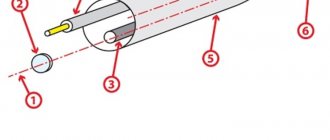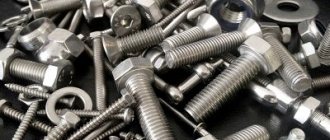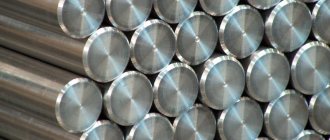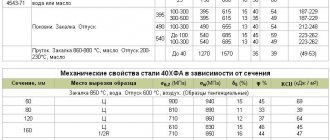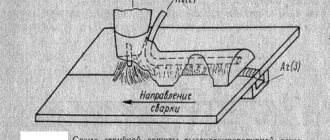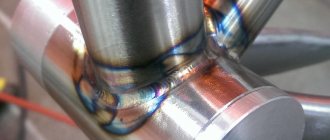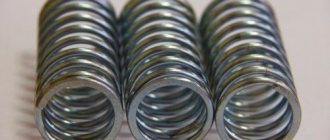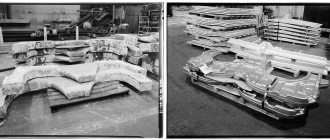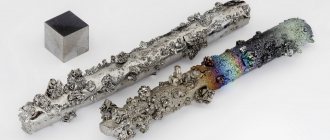Steel and titanium 2021
Steel vs. Titanium
Titanium's physical properties make it the material of choice used in automobiles, aerospace, jewelry, and many other industries. It is known for its high strength and durability, durability and low density, as well as its ability to withstand high and low temperatures. Corrosion resistance and biocompatibility of titanium are two more attributes that are very useful in various applications such as surgical implants, etc. It is expensive and costly as compared to steel. Steel is corrosive, rusts, stains and is heavier than titanium. The density of steel is 7.85 g/cm3 and titanium is 56% of steel.
Compared to steel, titanium has exceptional resistance to a wide range of acids, alkalis, natural waters and industrial chemicals. Titanium is considered a superior combination of high strength and low weight factors compared to steel. Another reason that is preferred in surgical implants and deep tubular strings is that titanium-based alloys are lightweight and stronger. Steel is preferred in industry where strength is more important than weight. Titanium is used for surgical implants because the human body accepts it and it is non-toxic and biologically inert. Stainless steel metal implants are prone to developing some serious diseases and diseases. Titanium is in high demand among computer manufacturers for the manufacture of computer components. Another popular use of titanium is for jewelry. Titanium is in strong competition with steel in the automotive industry. Steel is used where there is a need for a hardened material, such as axles for cars or trucks, while titanium structures are not guaranteed to last and have a fatigue limit.
Certain claims from marketing partners and companies have given way to the controversy that titanium is stronger than steel, but in contrast to the claim, the best steel is stronger than titanium alloys. In its unalloyed state, titanium is 45% lighter and stronger than steel. We can assume that the same steel rod will be 5% stronger than titanium, but titanium will be 40% lighter. Another difference is titanium's ability to withstand high temperatures without any weight loss. Carbon steel cannot withstand high temperatures. Steel can withstand about 2,700 degrees Fahrenheit, while titanium can withstand 3,300 degrees Fahrenheit. When comparing the thermal and cold stability of titanium and steel, titanium is more thermally stable than steel; which is 800 degrees Fahrenheit, making it an excellent choice for negative weather material because it will not break, whereas steel can. Another benefit of having titanium over steel is that it can be bent or tilted repeatedly and is flexible enough to not break like steel.
1. Titanium is an unexplored and biologically inert metal.
2. Steel is stronger but more susceptible to fatigue than titanium.
3. Steel can fracture while titanium can withstand high and low temperatures.
4. Steel is magnetic and corrosive compared to titanium which is non-magnetic and anti-corrosive.
5. Steel is preferred when strength in a hard material is required, while titanium is preferred when light and strong material is required.
Properties and applications of titanium alloys
Below is an overview of the most commonly found titanium alloys, divided into classes, their properties, advantages and industrial applications.
7th grade
Grade 7 is mechanically and physically equivalent to Grade 2 pure titanium, except for the addition of the intermediate element palladium, making it an alloy. It has excellent weldability and elasticity, the most corrosion resistance of all alloys of this type.
Class 7 is used in chemical processes and manufacturing equipment components.
Grade 11
Class 11 is very similar to Class 1, except for the addition of palladium to improve corrosion resistance, making it an alloy.
Other beneficial properties include optimum ductility, strength, toughness and excellent weldability. This alloy can be used especially in applications where corrosion is a problem:
- chemical treatment;
- production of chlorates;
- desalination;
- marine applications.
Ti 6Al-4V, class 5
Ti 6Al-4V alloy, or grade 5 titanium, is the most commonly used. It accounts for 50% of total titanium consumption worldwide.
Ease of use lies in its many advantages. Ti 6Al-4V can be heat treated to increase its strength. This alloy has high strength with low weight.
It is the best alloy for use in several industries such as aerospace, medical, marine and chemical processing. It can be used to create:
- aircraft turbines;
- engine components;
- aircraft structural elements;
- aerospace fasteners;
- high-performance automatic parts;
- sports equipment.
Ti 6AL-4V ELI, class 23
Class 23 - surgical titanium. Ti 6AL-4V ELI alloy, or grade 23, is a higher purity version of Ti 6Al-4V. It can be made from rolls, threads, wires or flat wires. It is the best choice for any situation where a combination of high strength, low weight, good corrosion resistance and high toughness is required. It has excellent damage resistance.
It can be used in biomedical applications such as implantable components due to its biocompatibility, good fatigue resistance. It can also be used in surgical procedures to make the following structures:
- orthopedic pins and screws;
- ligature clamps;
- surgical staples;
- springs;
- orthodontic devices;
- cryogenic vessels;
- bone fixation devices.
12th grade
Titanium grade 12 has excellent high-quality weldability. It is a high-strength alloy that provides good strength at high temperatures. Grade 12 titanium has characteristics similar to 300 series stainless steels.
Its ability to be shaped in a variety of ways makes it useful in many applications. The alloy's high corrosion resistance also makes it invaluable for manufacturing equipment. Class 12 can be used in the following industries:
- heat exchangers;
- hydrometallurgical applications;
- chemical production at elevated temperatures;
- maritime and air components.
Stronger than steel, lighter than titanium
Titanium is stronger than steel, although it has almost half the density of iron. But how will this metal behave when fired from a firearm? The hosts of the YouTube channel Demolition Ranch decided to find the answer to this question and tried to pierce a titanium ingot with bullets of popular calibers.
A 1.5-inch (about 4 cm) thick ingot was used for testing. First, the ingot was fired with small caliber bullets (.22 LR), but they, like 9 mm pistol bullets, did not leave noticeable marks on it. Then the shelling continued with heavy pistol bullets of .44 Magnum caliber and rifle bullets, including armor-piercing ones. The maximum damage to the ingot was caused by a 7.62 caliber bullet with a steel core, which left a depression with a diameter of 4 mm on its surface. Titan was able to withstand a hit from a lead bullet of .50 BMG caliber (12.7x99 mm), but an armor-piercing bullet of this caliber almost pierced the ingot, leaving a bulge with cracks on its opposite side.
Today, body armor with titanium armor plates are produced in many countries around the world, but due to the high cost of titanium and the complexity of its processing, they are in less demand than protection made from steel and metal-ceramic plates.
About other features
The increased hardness of tungsten carbide and thissten gives the rings enviable advantages, but makes them fragile. Not in the sense that they, like crystal, break into hundreds of small fragments. But if there is a strong impact with a heavy object or a fall from a height (on asphalt, ceramic tiles, concrete), the ring may crack or burst, breaking into two parts. In a long chain of advantages, this is perhaps their only weak link.
Steel and titanium rings do not have this feature. If dropped, they will remain intact; the worst outcome is a few scratches.
Myths about Titan
Several myths about titanium
I answer the most common misconceptions regarding titanium and products made from it.
1. Titanium is the most durable and hardest material. Nothing like that, the most durable and hardest material in the world is diamond. Common hard materials include very hard tungsten carbide and many tungsten-molybdenum-containing alloys. These are cold and heavy materials that are practically not amenable to machining by turning and milling, and even more complex and modern processing technologies are used for them. In fact, the vast majority of the toughest metal-cutting tools are made from some combination of tungsten and other hard elements, including tools for machining titanium. Tungsten-containing alloys are classified as hard alloy materials. They are practically not used for making jewelry, only occasionally, because... the manufacture of complex products from tungsten-containing materials requires too huge production capacities, justified only in mechanical engineering and metal production, where such jewelry is considered a not-so-cool bonus to the main activity. Below is a diagram for measuring hardness using a hardness tester, in various units.
2. Titanium does not scratch. It scratches, and how. True, the differences in the scratchiness of the brands are quite pronounced and noticeable even with the naked eye. This parameter is influenced by the chemical composition of the alloy and the type of post-processing of the workpiece. Titaniums of top brands, products from which last in all their glory for a long time, are expensive and extremely difficult to get. And cheap brands are on sale at any metal warehouse and cost a penny, but the products made from them are cheap, but will not shine with quality. However, it is worth noting that precious metals scratch at least twice as hard as the cheapest grade of titanium. Some types of titanium alloy are easy to scratch, some are more difficult, and some are even more difficult. In any case, those who claim that titanium does not scratch are lying. However, to improve surface hardness, special coatings can be applied to products, which will significantly increase wear resistance. A picture of the “scratched surface” is attached.
3. Titanium is absolutely biocompatible. Almost true. However, only almost. There are several bio-incompatible (more precisely, allergenic) brands that contain harmful impurities (but these brands are quite rare and it is unlikely that the master will come across them, but who the hell is not kidding), also similar impurities that cause allergies, necrosis, or at least unpleasant sensations can can also be found in cheap brands due to low quality control of the composition in production (“Why, one might ask, check these samples for biocompatibility, bother with perfect cleaning, when we are going to make a housing out of them for the space station thermostat, which will also be located outside the ship?"). Therefore, before making jewelry and costume jewelry, a decent master jeweler will always take a sample of the material for chemical analysis, and only then offer it to the client. Below is a beautiful picture of a dental implant.
4. Titanium products should be cheap, because titanium is a very cheap material. The most common misconception! Titanium, compared to precious metals, is, of course, inexpensive, however:
a) There are very big problems in purchasing good brands in small quantities, because... such titanium is sold only in large industrial quantities, or even not sold at all - God grant that you can buy some scrap from the leftovers “from the master’s table” of the space and military industry, maybe you’ll get lucky. The most expensive titanium in the world costs about $1,500 per kilogram, the cheapest - about 1,500 rubles per kilogram (as of 2019)
Hypoallergenic properties
Almost any metal jewelry can cause an allergy. It all depends on the composition of the alloy and individual physiology. The base alloys (tungsten, titanium, gold, etc.) are mostly hypoallergenic. The culprits of negative reactions are impurities and additives. They are present in a large number of jewelry alloys made of platinum, silver, gold, as well as in tungsten carbide, thissten, 316L steel and even titanium (with the exception of ASTM-F136 titanium, from which jewelry for primary piercings and medical implants are created).
If you have already encountered an allergy to nickel, chromium, cobalt or other additive metals, you cannot exclude the possibility of its reoccurrence. You will have to approach the choice of jewelry as carefully as possible and, perhaps, some types of modern jewelry will be prohibited for you. In other cases, rings made from alternative metals have proven themselves to be excellent. Customer complaints about negative reactions related to 316L steel, tungsten, titanium and thissten models are rare in our store.

